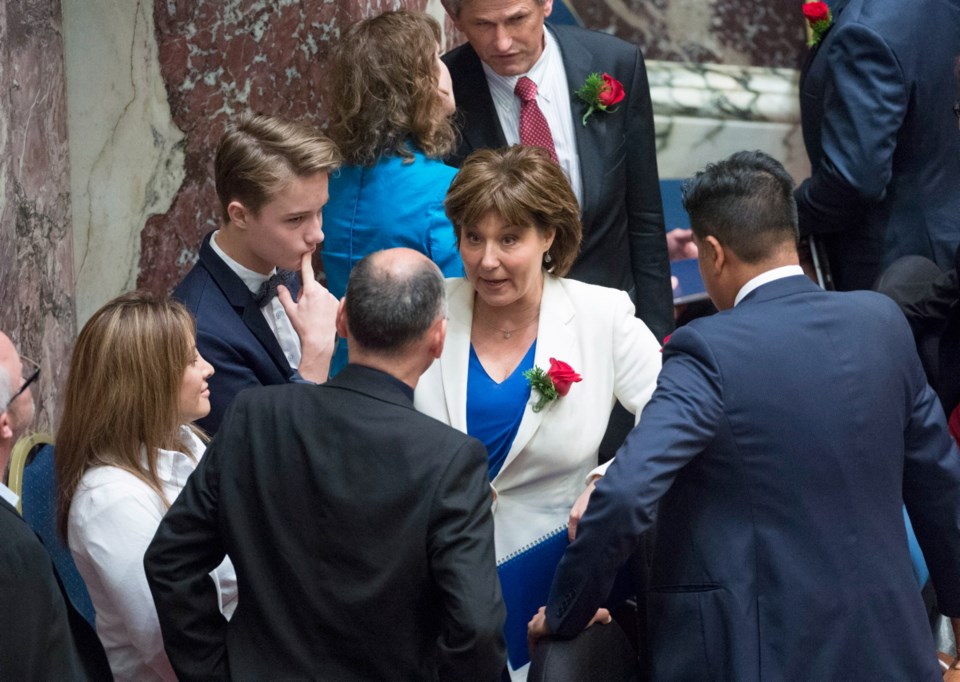The unprecedented teeter-totter state of B.C.’s legislature makes for gripping political drama, but it is also making British Columbians nervous. Party leaders and MLAs need to set aside games and posturing, and buckle down to the business of governing the province.
Thursday’s speech from the throne brought few surprises, given that Premier Christy Clark has been generous in revealing what it would contain.
The B.C. Liberals grabbed large chunks of the NDP and Green platforms and ran with them, daring those parties to repudiate their own platforms by voting against the throne speech next week.
While Clark and her party have drastically changed their tune on many issues, it’s an unconvincing deathbed conversion. The Liberals have long been deaf to bringing in a poverty-reduction plan, reluctant to raise welfare rates and opposed to banning union and corporate political donations. As if suddenly rediscovering her “family first” agenda, the premier has promised a massive investment in daycare that will create up to 60,000 new spaces.
Rather than congratulating the Liberals for coming around to his way of thinking, NDP Leader John Horgan dismisses those promises.
“It is really hard to believe that after 16 years of ignoring child care, ignoring people with disabilities, ignoring income assistance rates, that all of a sudden, after the people have rejected you at the polls, that our platform looks pretty appealing,” he said Wednesday.
Horgan is right to question Clark’s sincerity — the Liberals’ change of heart looks a lot more like a cynical last-ditch attempt to cling to power than it does a genuine shift in philosophy. Clark’s government is likely to fall in a nonconfidence motion — and she knows it — so she has little to risk by promising the sky.
But that does not mean easy sailing for Horgan who, if the scenario plays out as anticipated, will become premier after the Liberal government falls next week.
In early June, he chided Clark for being so slow to recall the legislature, saying “it will be more than six weeks since British Columbians voted overwhelmingly to replace her.” He came to that conclusion, apparently, by calculating that 59.88 per cent of voters cast their ballots against the Liberals.
If he were to follow that resolution to its logical conclusion, though, he would have to conclude that British Columbians also voted even more overwhelmingly to kick him out — 59.96 per cent didn’t vote for the NDP. And no one cast a vote for an NDP-Green alliance.
Nevertheless, Clark’s fragile government will likely topple next week, to be replaced by a coalition that is almost as fragile. The election of a new Speaker from the government ranks will leave the legislature with 43 MLAs on each side.
Granted, the Speaker is bound by tradition to vote with the government in breaking a tie, but the absence of one MLA could conceivably bring down Horgan’s government. That’s not likely to happen in the immediate future, and it’s just as well — any person or party who sparked a snap election would face the wrath of voters. An Angus Reid poll indicates that 71 per cent of British Columbians want the process to play out, rather than enduring another election this soon.
And 11 per cent are having buyers’ remorse — they would vote differently if given a mulligan, with slightly more of this group favouring the Liberals over the NDP.
Clearly, many British Columbians wanted change, but support for Horgan is not overwhelming. It would behoove him and his partners to govern carefully and respectfully.
It’s a time of uncertainty in B.C., but some of that uncertainty could be allayed if legislators can stop playing games and get on with governing.



